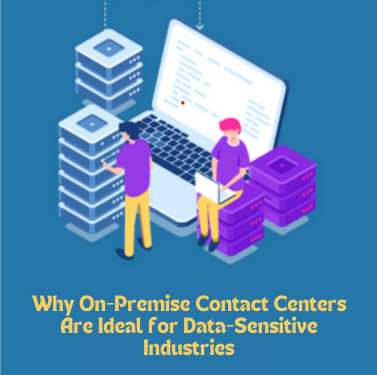Today, every business must prioritize data protection and confidentiality. This is vital for sectors like healthcare, finance, and government. They handle private data. The choice of contact center tools can make or break their data security. On-premise contact centers offer the best control and security for these organizations. Now, let’s explore why on-premise solutions are deemed perfect for data-intensive industries.
- Enhanced Data Security: The Fortress of Information Protection
On-premise solutions are preferred in industries that are sensitive to data security and regulatory compliance because they offer total control. These solutions help organizations ensure strict security protocols are in place and almost eliminate the possibility of cyber threats and data breaches. For example, on-premise contact center solutions make it easier to satisfy some kinds of legal requirements, including HIPAA and GDPR.
Furthermore, they provide clearly defined long-term costs since they are compliant with the organization’s legacy systems; thus, improving organizational processes and guaranteeing availability and reliability. Due to its high levels of security, compliance with the law, as well as functionality, on-premise contact center solutions are highly preferred in industries dealing with large amounts of sensitive data.
In an era where data breaches can cost millions and destroy reputations, on-premise contact centers provide a robust defense against cyber threats.
Absolute Control over Data
On-premise solutions let you fully control your data. You manage its storage. Your data stays within your physical space. In contrast, SAAS models rely on the provider’s security. This control is crucial in industries where information is critical.
Mitigation of Cyber Threats
When all data remains stored locally, that is, within the local internal infrastructure, the instances of external cyber threats are greatly reduced. This is especially important given that 60% of small businesses that close shop after suffering a data breach do so within six months of the breach being done.
- Compliance with Regulatory Requirements: Staying on the Right Side of the Law
For data-sensitive industries, compliance isn’t just a buzzword – it’s a legal necessity. On-premise contact centers make adherence to strict regulations much more manageable.
Adherence to Industry-Specific Regulations
On-premise solutions assist in meeting HIPAA requirements for healthcare and GDPR standards for finance. Most organizations say keeping data control is key for compliance.
Audit and Reporting Capabilities
On-premise systems provide strong audit trails and reporting. This is vital for compliance during inspections. Most organizations find detailed reporting essential.
- Cost Efficiency and Predictability: The Long-Term Financial Advantage
While the initial setup costs for on-premise contact centers can be higher, they often result in significant long-term savings.
On-premise contact centers can be cheaper in the long run than cloud solutions. They avoid ongoing service fees and unpredictable cloud data costs. Organizations that utilize their existing IT infrastructure can increase ROI by 40% by adding contact center solutions. This makes on-premise solutions appealing for companies with established IT.
- Integration with Legacy Systems: Bridging the Old and the New
Many organizations face challenges in integrating new technologies with their existing systems. Yet, on-premise contact centers manage to easily blend their new technologies.
On-premise solutions can effectively integrate with legacy systems such as PBX telecoms and CRM platforms. This is vital, as 80% of businesses report that integration with existing technologies enhances operational efficiency.
With on-premise contact centers, organizations can tailor their solutions to meet specific business needs. 78% of companies note that customized solutions significantly improve customer service and operational efficiency.
- High Availability and Reliability: Keeping the Lines Open
There is no room for ‘downtime’ in customer service, business must go on regardless of the hour or day of the week. In comparison, on-premise contact centers are generally more reliable and always available.
Controlled Environment
On-premise solutions allow organizations to control their setups for electricity, cooling, and security. This ensures high system availability and reliability.
Reduced Dependency on Internet Connectivity
Unlike cloud solutions, on-premise call centers don’t rely on internet connections. This reduces the risk of service interruptions due to internet issues.
- Strategic Flexibility: Adapting to Future Needs
The business world is competitive and ever-changing. Your contact center should adapt too. However, traditional on-premise solutions offer valuable long-term strategic flexibility.
Hybrid Approaches
Organizations can use a hybrid model. They keep critical data and operations on-site. For less sensitive tasks, they can turn to the cloud. This method offers flexibility and eases the shift to the cloud if needed.
Future-Proofing IT Strategy
On-premise solutions allow businesses to control their IT growth. They set the pace for technology and infrastructure changes. This approach helps the contact center expand to meet business needs.
Comparison Table: On-Premise vs. Cloud Contact Centers for Data-Sensitive Industries
| Feature | On-Premise Contact Centers | Cloud Contact Centers |
| Data Control | Complete control | Limited control |
| Security | Enhanced, customizable | Dependent on provider |
| Compliance | Easier to maintain | Can be challenging |
| Initial Costs | Higher | Lower |
| Long-term Costs | Lower | Higher |
| Integration | Seamless with legacy systems | May require adaptations |
| Customization | Highly customizable | Limited customization |
| Reliability | High, independent of internet | Dependent on internet connection |
| Scalability | Requires hardware investment | Easily scalable |
| Maintenance | In-house responsibility | Provider responsibility |
This comparison table highlights the differences between on-premise and cloud contact centers for data-sensitive companies. It shows that on-premise solutions excel in data ownership, security, regulatory compliance, and compatibility. These factors are crucial for industries handling confidential client information.
Conclusion: The Clear Choice for Data-Sensitive Industries
For industries focused on data security and regulations, on-premise contact centers are ideal. They offer better security, compliance, cost savings, scalability, integration, reliability, and flexibility. Cloud solutions are valuable, but on-site centers offer more control and better security. This is crucial for industries handling sensitive customer data. They prefer on-premise solutions, ensuring they meet current and future security and compliance needs.
FAQs
- What are the primary security advantages of on-premise contact centers over cloud-based solutions? On-premise contact centers offer full control over data security. This helps prevent cyber threats and meets industry-specific needs. Such control is crucial for sectors handling large data volumes.
- How do on-premise contact centers ensure compliance with regulatory requirements? On-premise solutions make it easier for organizations to meet HIPAA and GDPR standards. They keep data in-house and offer strong audit and reporting features. These are vital for proving compliance during inspections.
- Are on-premise contact centers more cost-effective in the long run? However, they are cheaper in the long run. They eliminate ongoing cloud service fees. Also, they make use of existing IT investments. This can cut long-term costs by thirty percent compared to cloud solutions.
- What is the reliability advantage of on-premise contact centers? On-premise contact centers allow organizations to manage their environments, ensuring reliability and availability. They also reduce the need for external internet, minimizing issues during outages.




![7 Best POS Software in the UK [2026 Edition]](https://todaynews.co.uk/wp-content/uploads/2026/02/7-Best-POS-Software-in-the-UK-2026-Edition-360x180.png)







































































